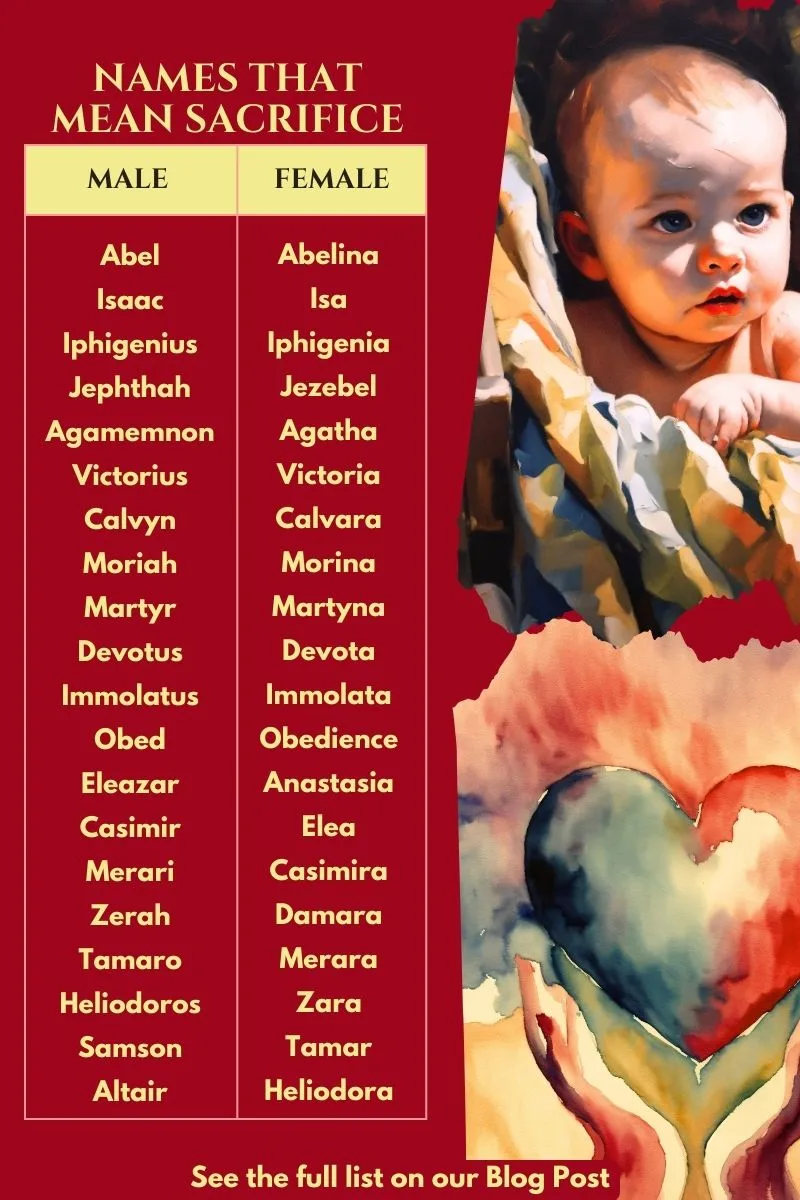
Naming a child is a special moment, and choosing a name that means “sacrifice” adds deep meaning. Sacrifice stands for selflessness and dedication—qualities that are both powerful and enduring.
Why is sacrifice such a powerful concept in a name? It represents deep values of selflessness and commitment, reflecting enduring love and dedication that can inspire throughout life.
Names meaning sacrifice have rich cultural and historical significance. They often symbolize devotion and honor across various traditions, offering a glimpse into the values and stories that have shaped human history.
In this blog post, you’ll discover top 100 names that mean sacrifice. These names come from various cultures and show different meanings of sacrifice.
Explore names that mean sacrifice and discover their unique beauty and meaning. These names hold deep stories and values that can add richness to your naming journey.
Male Names That Mean Sacrifice
| Name | Origin | Meaning |
| Agni | Sanskrit | Sacrifice, Fire |
| Cultural Significance: In Hinduism, Agni represents the sacrificial fire, symbolizing purification and transformation. | ||
| Isaac | Hebrew | Laughter, Faith |
| Cultural Significance: Isaac is known for Abraham’s test of faith, representing divine trust and sacrifice in biblical tradition. | ||
| Icarus | Greek | Self-Sacrifice |
| Cultural Significance: Icarus symbolizes the idea of self-sacrifice and ambition, known for flying too close to the sun in Greek mythology. | ||
| Caius | Latin | Rejoice, Sacrifice |
| Cultural Significance: Caius reflects Roman heritage, symbolizing joy in sacrifice and strength of character. | ||
| Damian | Greek | To Tame, Subdue |
| Cultural Significance: Often associated with strength and sacrifice, Damian is a name rooted in taming one’s desires for a higher cause. | ||
| Eyal | Hebrew | Strength, Sacrifice |
| Cultural Significance: Eyal represents inner strength and willingness to sacrifice for the greater good, reflecting ancient Hebrew values. | ||
| Atlas | Greek | Endurance |
| Cultural Significance: In Greek mythology, Atlas bore the weight of the heavens, symbolizing endurance and sacrifice for stability. | ||
| Othniel | Hebrew | Lion of God, Sacrifice |
| Cultural Significance: Othniel signifies divine strength and courage, often linked to sacrificial leadership in biblical stories. | ||
| Paras | Hindi | Supreme Sacrifice |
| Cultural Significance: Paras signifies purity and the ultimate sacrifice in Indian culture, often representing noble deeds. | ||
| Agniv | Sanskrit | Fire of Sacrifice |
| Cultural Significance: Agniv is associated with the sacred fire used in ancient Vedic rituals, symbolizing purification and sacrifice. | ||
| Mardonios | Persian | Warrior, Sacrifice |
| Cultural Significance: This name reflects Persian values of bravery and self-sacrifice, often used to describe noble warriors. | ||
| Zeus | Greek | Supreme Sacrifice |
| Cultural Significance: As a major deity, Zeus represents ultimate sacrifice and leadership, often associated with divine responsibility. | ||
| Quirinus | Roman | Sacrifice, Strength |
| Cultural Significance: Quirinus is an ancient Roman deity symbolizing military strength and sacrificial protection of the state. | ||
| Mithras | Persian | Covenant, Sacrifice |
| Significance: Mithras was a deity associated with sacred contracts and sacrificial rituals in ancient Persian religion. | ||
| Zayd | Arabic | Growth, Sacrifice |
| Cultural Significance: Zayd signifies prosperity through sacrifice and is often associated with Islamic teachings on selflessness. | ||
| Tiberius | Latin | Sacred Sacrifice |
| Cultural Significance: Tiberius reflects Roman traditions of sacred rites and sacrifice for the community’s well-being. | ||
| Einar | Old Norse | One Warrior, Sacrifice |
| Cultural Significance: Einar means “lone warrior,” emphasizing self-sacrifice and courage in battle, central to Norse mythology. | ||
| Ayaan | Arabic | Gift of Sacrifice |
| Cultural Significance: Ayaan is often used to describe the spiritual gift of sacrifice and divine purpose in Arabic culture. | ||
| Samson | Hebrew | Sun, Sacrifice |
| Cultural Significance: Samson is a biblical figure known for his strength and ultimate sacrifice, symbolizing devotion and faith. | ||
| Achilles | Greek | Pain, Sacrifice |
| Cultural Significance: Achilles, a hero of Greek mythology, symbolizes the pain and honor of sacrifice for glory. | ||
| Damon | Greek | Constant, Sacrifice |
| Cultural Significance: Damon embodies unwavering loyalty and sacrifice, often remembered for his legendary friendship with Pythias. | ||
| Elmo | Italian | Protection, Sacrifice |
| Cultural Significance: Elmo is linked to Saint Elmo, known for sacrificial acts of protection and care for sailors. | ||
| Ansel | Germanic | Divine Sacrifice |
| Cultural Significance: Ansel signifies divine protection and sacrifice, associated with ancient Germanic traditions of guardianship. | ||
| Theron | Greek | Hunter, Sacrifice |
| Cultural Significance: Theron is a name that symbolizes sacrificial strength and protection, often linked to guardians of the wilderness. | ||
| Quirin | Latin | Spear, Sacrifice |
| Cultural Significance: Quirin signifies the spear of sacrifice, representing Roman values of protection and service to the state. | ||
| Rahul | Sanskrit | Conqueror, Sacrifice |
| Cultural Significance: Rahul is a name that signifies sacrifice and victory, often associated with spiritual conquest in Indian culture. | ||
Female Names That Mean Sacrifice
| Name | Origin | Meaning |
| Iphigenia | Greek | Born to Strength, Sacrifice |
| Cultural Significance: In Greek mythology, Iphigenia was the daughter of Agamemnon, who was offered as a sacrifice to appease the goddess Artemis. Her story symbolizes devotion, courage, and the complexities of duty and love. | ||
| Jocasta | Greek | Moon, Sacrifice |
| Cultural Significance: Jocasta’s name is linked to Greek tragedies, where her sacrifices and trials emphasize themes of fate, family loyalty, and the tragic beauty of selflessness. | ||
| Zelophehad | Hebrew | Shadow, Sacrifice |
| Cultural Significance: In the Hebrew Bible, Zelophehad’s daughters are known for their courage and willingness to stand up for their rights, symbolizing sacrifice for justice and equality. | ||
| Andromeda | Greek | Ruler of Men, Sacrifice |
| Cultural Significance: Andromeda, a character in Greek mythology, was offered as a sacrifice to a sea monster, representing innocence and the bravery of facing one’s destiny. | ||
| Anastasia | Greek | Resurrection, Sacrifice |
| Cultural Significance: Anastasia, meaning “resurrection,” symbolizes sacrifice and rebirth, often associated with spiritual renewal and enduring strength. | ||
| Yaretzi | Aztec | You Will Always Be Loved, Sacrifice |
| Cultural Significance: Yaretzi conveys deep affection and sacrifice, reflecting the Aztec belief in love’s eternal power and the beauty of giving without expecting anything in return. | ||
| Antigone | Greek | Worthy of One’s Parents, Sacrifice |
| Cultural Significance: In Greek mythology, Antigone’s act of sacrificing herself for her brother’s burial rites exemplifies the themes of familial duty and defiance against tyranny. | ||
| Cassia | Greek | Cinnamon, Sacrifice |
| Cultural Significance: Cassia, derived from the spice known for its warmth and healing properties, symbolizes self-sacrifice and the comforting strength of women. | ||
| Isolde | Celtic | Fair, Sacrifice |
| Cultural Significance: Isolde, a tragic heroine in Arthurian legends, embodies sacrificial love and devotion, reflecting themes of romantic tragedy and eternal loyalty. | ||
| Nia | Welsh | Bright, Sacrifice |
| Cultural Significance: Nia symbolizes sacrifice and hope, often associated with Welsh traditions of enlightenment and the nurturing strength of women. | ||
| Branwen | Welsh | Blessed Raven, Sacrifice |
| Cultural Significance: Branwen, a character in Welsh mythology, represents the tragic beauty of sacrifice for peace and reconciliation, embodying grace and resilience. | ||
| Inanna | Sumerian | Lady of Heaven, Sacrifice |
| Cultural Significance: Inanna is a goddess in Sumerian mythology known for her descent into the underworld, symbolizing the transformative power of sacrifice and renewal. | ||
| Narcissa | Greek | Self-Sacrifice, Reflection |
| Cultural Significance: Narcissa’s name, related to the narcissus flower, signifies the duality of beauty and sacrifice, highlighting the personal cost of introspection. | ||
| Ivana | Slavic | Gift from God, Sacrifice |
| Cultural Significance: Ivana reflects Slavic traditions of divine sacrifice, embodying grace and the giving nature of women in spiritual contexts. | ||
| Mariam | Hebrew | Beloved, Sacrifice |
| Cultural Significance: Mariam, a name with biblical roots, symbolizes sacrificial love and purity, often linked to stories of devotion and maternal care. | ||
| Sade | African | Honor Confers a Crown, Sacrifice |
| Cultural Significance: Sade is a Yoruba name that signifies the honor and grace found in sacrificial acts, celebrating the strength and dignity of African women. | ||
| Galadriel | Elvish | Radiant Maiden, Sacrifice |
| Cultural Significance: Galadriel, a character from Tolkien’s legendarium, embodies wisdom and sacrifice, often seen as a guiding light in times of darkness. | ||
| Adira | Hebrew | Strong, Sacrifice |
| Cultural Significance: Adira is a name that embodies strength and resilience, symbolizing the self-sacrificial spirit of women who stand firm in the face of adversity. | ||
| Kachina | Hopi | Spirit, Sacrifice |
| Cultural Significance: In Hopi tradition, Kachina represents spiritual guides and the sacrifices made for community harmony and spiritual connection. | ||
| Eirene | Greek | Peace, Sacrifice |
| Cultural Significance: Eirene, the Greek goddess of peace, represents the sacrifice required to achieve harmony, embodying the calming and nurturing aspects of womanhood. | ||
| Boudicca | Celtic | Victory, Sacrifice |
| Cultural Significance: Boudicca, a historical figure and Celtic warrior queen, symbolizes the fierce sacrifice and leadership in the fight for freedom and justice. | ||
| Althea | Greek | Healing, Sacrifice |
| Cultural Significance: Althea, linked to healing herbs, represents the nurturing sacrifice and restorative power of women, often seen in Greek legends as a protector and healer. | ||
| Marina | Latin | Sea, Sacrifice |
| Cultural Significance: Marina embodies the strength and sacrifice of the sea, symbolizing the vast, nurturing, and sometimes tumultuous nature of feminine power. | ||
| Leocadia | Greek | Bright, Sacrifice |
| Cultural Significance: Leocadia, meaning brightness, reflects the light and sacrifice of women who bring clarity and wisdom to their communities, rooted in early Christian history. | ||
| Yocheved | Hebrew | Glory of God, Sacrifice |
| Cultural Significance: Yocheved, mother of Moses, exemplifies the sacrifice and strength found in motherhood, representing the selfless dedication and faith in biblical narratives. | ||
Related: Explore 900+ Unique Mexican Girl Names with Meanings from A to Z
Unisex Names That Mean Sacrifice
| Name | Origin | Short Meaning |
| Kiran | Sanskrit | Ray, Sacrifice |
| Cultural Significance: Kiran represents the light or ray of sacrifice, embodying the idea of illumination through selflessness and contribution. | ||
| Nuri | Arabic | Light, Sacrifice |
| Cultural Significance: Nuri signifies divine light and the sacrifice involved in illuminating others’ lives, reflecting a profound sense of spiritual dedication. | ||
| Rami | Arabic | Archer, Sacrifice |
| Cultural Significance: Rami symbolizes precision and sacrifice, often associated with the role of an archer who must be focused and self-sacrificing for the greater good. | ||
| Ari | Hebrew | Lion, Sacrifice |
| Cultural Significance: Ari represents courage and strength, reflecting the sacrificial qualities of a lion’s protective nature and bravery. | ||
| Sage | Latin | Wise, Sacrifice |
| Cultural Significance: Sage denotes wisdom and the sacrificial nature of sharing knowledge, embodying the role of a wise guide who sacrifices for the benefit of others. | ||
| Ren | Japanese | Lotus, Sacrifice |
| Cultural Significance: Ren, meaning lotus, symbolizes purity and the sacrificial growth required to rise above challenges, representing spiritual and personal development. | ||
| Harper | English | Harp Player, Sacrifice |
| Cultural Significance: Harper reflects the artistry and dedication of musicians, representing the sacrifice of personal time for the enrichment of others through music. | ||
| Skyler | Dutch | Scholar, Sacrifice |
| Cultural Significance: Skyler signifies learning and the dedication required to pursue knowledge, embodying the sacrifice involved in academic and intellectual endeavors. | ||
| Jordan | Hebrew | Descending, Sacrifice |
| Cultural Significance: Jordan, named after the river where significant biblical events occurred, symbolizes the sacrifices involved in spiritual journeys and transformation. | ||
| Rowan | Gaelic | Little Red One, Sacrifice |
| Cultural Significance: Rowan, associated with the rowan tree, signifies protection and sacrifice, often linked to ancient Celtic traditions of safeguarding and nurturing. | ||
| Morgan | Welsh | Sea-born, Sacrifice |
| Cultural Significance: Morgan reflects the deep and enduring sacrifices associated with the sea, symbolizing resilience and the nurturing qualities of the ocean. | ||
| Indigo | Greek | Deep Blue, Sacrifice |
| Cultural Significance: Indigo represents depth and sacrifice, symbolizing the rich, profound contributions made through selflessness and dedication. | ||
| Cruz | Spanish | Cross, Sacrifice |
| Cultural Significance: Cruz signifies the Christian cross, embodying the ultimate sacrifice and the spiritual significance of selflessness and devotion. | ||
| Ainsley | Scottish | One’s Own Meadow, Sacrifice |
| Cultural Significance: Ainsley reflects the personal sacrifice involved in tending to one’s own land, symbolizing care and dedication to growth and sustenance. | ||
| Dakota | Native American | Allies, Sacrifice |
| Cultural Significance: Dakota symbolizes partnership and the sacrifices made in standing together and supporting one another, reflecting the values of unity and mutual aid. | ||
| Phoenix | Greek | Rebirth, Sacrifice |
| Cultural Significance: Phoenix represents resurrection and transformation, symbolizing the sacrificial process of renewal and emerging stronger from challenges. | ||
| Ariel | Hebrew | Lion of God, Sacrifice |
| Cultural Significance: Ariel reflects divine strength and protection, embodying the sacrificial nature of guardianship and spiritual leadership. | ||
| Riley | Irish | Valiant, Sacrifice |
| Cultural Significance: Riley signifies bravery and the sacrifices involved in courageous acts, reflecting the spirit of valiant deeds and selfless acts. | ||
| Teagan | Irish | Little Poet, Sacrifice |
| Cultural Significance: Teagan represents the creative sacrifices made in the pursuit of art and expression, embodying the dedication of poets and artists. | ||
| Finley | Scottish | Fair-haired Warrior, Sacrifice |
| Cultural Significance: Finley signifies strength and the sacrifices involved in protection and leadership, symbolizing the warrior spirit and dedication. | ||
| Casey | Irish | Brave, Sacrifice |
| Cultural Significance: Casey embodies bravery and the self-sacrifice associated with standing up for what is right, reflecting the courageous spirit of its bearers. | ||
| Kai | Hawaiian | Sea, Sacrifice |
| Cultural Significance: Kai signifies the ocean and the sacrifices involved in navigating its vastness, symbolizing resilience and the nurturing nature of the sea. | ||
| Avery | English | Ruler of the Elves, Sacrifice |
| Cultural Significance: Avery reflects the mystical and sacrificial roles of guardianship and leadership, representing the commitment to guiding and protecting others. | ||
| Tatum | English | Cheerful, Sacrifice |
| Cultural Significance: Tatum symbolizes the joyful sacrifice of spreading happiness and positivity, embodying the selflessness involved in uplifting others. | ||
| Quinn | Irish | Wisdom, Sacrifice |
| Cultural Significance: Quinn reflects the wisdom gained through sacrifice, symbolizing the deep understanding and insight achieved through selfless acts. | ||
| Skylar | Dutch | Scholar, Sacrifice |
| Cultural Significance: Skylar signifies the pursuit of knowledge and the sacrifices made in academic and intellectual endeavors, reflecting dedication and learning. | ||
| Ellis | Welsh | Benevolent, Sacrifice |
| Cultural Significance: Ellis represents kindness and the sacrifices associated with benevolence, embodying the spirit of selfless giving and compassion. | ||
| Jules | French | Youthful, Sacrifice |
| Cultural Significance: Jules signifies the youthful energy and sacrifices involved in growth and exploration, reflecting the vibrant and transformative aspects of youth. | ||
| Robin | English | Bright, Sacrifice |
| Cultural Significance: Robin embodies the brightness and sacrifices of nurturing and guiding, symbolizing the role of providing light and support in times of need. | ||
Rare and Unique Names That Mean Sacrifice
| Name | Origin | Short Meaning |
| Elowen | Cornish | Elm Tree, Sacrifice |
| Cultural Significance: Elowen, symbolizing strength and stability, reflects the sacrificial nature of enduring and providing support, much like an elm tree. | ||
| Seraphina | Hebrew | Fiery, Sacrifice |
| Cultural Significance: Seraphina means “fiery” or “burning,” representing the intense and sacrificial love and devotion often associated with the seraphim angels. | ||
| Ishara | Akkadian | Goddess of Oaths, Sacrifice |
| Cultural Significance: Ishara is associated with oaths and promises, symbolizing the sacred and sacrificial nature of commitments and divine pacts. | ||
| Hesper | Greek | Evening Star, Sacrifice |
| Cultural Significance: Hesper represents the evening star, embodying the sacrificial beauty and transition from day to night, symbolizing guidance and hope. | ||
| Zorina | Slavic | Golden, Sacrifice |
| Cultural Significance: Zorina signifies preciousness and the sacrifice of radiance and brilliance, often associated with rare and valuable qualities. | ||
| Tanith | Phoenician | Moon Goddess, Sacrifice |
| Cultural Significance: Tanith, as a moon goddess, reflects the sacrificial and nurturing aspects of lunar cycles and their influence on life. | ||
| Vespera | Latin | Evening, Sacrifice |
| Cultural Significance: Vespera, meaning “evening,” symbolizes the end of a journey and the sacrifices made during transitions, representing tranquility and closure. | ||
| Leocadia | Spanish | Bright, Sacrifice |
| Cultural Significance: Leocadia signifies brightness and the sacrificial role of bringing light and clarity, often linked to saintly virtues in Spanish culture. | ||
| Althea | Greek | Healing, Sacrifice |
| Cultural Significance: Althea embodies the healing and sacrificial nature of nurturing and restoring others, representing care and benevolence. | ||
| Zenobia | Greek | Life of Zeus, Sacrifice |
| Cultural Significance: Zenobia symbolizes a divine connection and the sacrifices involved in life and leadership, reflecting historical and mythological themes. | ||
| Isidore | Greek | Gift of Isis, Sacrifice |
| Cultural Significance: Isidore represents the divine gift and sacrificial offerings to the goddess Isis, reflecting ancient Egyptian spiritual traditions. | ||
| Amara | Igbo | Grace, Sacrifice |
| Cultural Significance: Amara signifies grace and the sacrificial nature of selflessness and love, embodying the virtues of caring and support in Igbo culture. | ||
| Xanthe | Greek | Yellow, Sacrifice |
| Cultural Significance: Xanthe reflects brightness and the sacrifices associated with bringing light and positivity, symbolizing renewal and vitality. | ||
| Nerina | Italian | Sea Nymph, Sacrifice |
| Cultural Significance: Nerina symbolizes the ocean’s depth and the sacrificial role of sea nymphs in mythology, representing mystery and dedication. | ||
| Amabel | Latin | Lovable, Sacrifice |
| Cultural Significance: Amabel embodies the sacrificial nature of love and affection, reflecting the selfless acts of care and compassion. | ||
| Yasmina | Persian | Jasmine Flower, Sacrifice |
| Cultural Significance: Yasmina signifies the delicate and sacrificial beauty of jasmine, symbolizing purity and the gentle nature of giving. | ||
| Eudora | Greek | Generous Gift, Sacrifice |
| Cultural Significance: Eudora reflects the sacrificial nature of generosity and giving, representing the selfless act of providing for others. | ||
| Thalassa | Greek | Sea, Sacrifice |
| Cultural Significance: Thalassa, meaning “sea,” represents the vast and nurturing qualities of the ocean, symbolizing the sacrifices of guardianship and depth. | ||
| Rhiannon | Welsh | Great Queen, Sacrifice |
| Cultural Significance: Rhiannon signifies regal sacrifice and leadership, often associated with mythological queens and their dedication to their realms. | ||
| Eirene | Greek | Peace, Sacrifice |
| Cultural Significance: Eirene embodies the sacrificial nature of achieving peace and harmony, symbolizing the role of peacekeepers and their dedication. | ||
| Liora | Hebrew | Light, Sacrifice |
| Cultural Significance: Liora signifies light and the sacrificial nature of spreading illumination and hope, representing warmth and guidance. | ||
| Celestia | Latin | Heavenly, Sacrifice |
| Cultural Significance: Celestia reflects the divine and sacrificial qualities of the heavens, symbolizing purity and spiritual elevation. | ||
| Iris | Greek | Rainbow, Sacrifice |
| Cultural Significance: Iris represents the connection between heaven and earth, embodying the sacrificial beauty and hope associated with rainbows. | ||
| Eulalia | Greek | Well-Spoken, Sacrifice |
| Cultural Significance: Eulalia signifies eloquence and the sacrificial nature of communication and expression, reflecting the power of words and advocacy. | ||
| Vesper | Latin | Evening Star, Sacrifice |
| Cultural Significance: Vesper represents the evening star, embodying the sacrificial beauty and transition from day to night, symbolizing guidance and hope. | ||
| Seren | Welsh | Star, Sacrifice |
| Cultural Significance: Seren reflects the sacrificial nature of guiding light, symbolizing the role of stars in providing direction and inspiration. | ||
| Elara | Greek | Bright, Sacrifice |
| Cultural Significance: Elara symbolizes brightness and the sacrificial role of shining light and guiding others, often linked to celestial themes. | ||
| Thalia | Greek | Blooming, Sacrifice |
| Cultural Significance: Thalia represents blooming and growth through sacrifice, embodying the nurturing and life-giving aspects of renewal and care. | ||
| Cyra | Persian | Sun, Sacrifice |
| Cultural Significance: Cyra signifies the sun and the sacrificial warmth and energy provided by it, symbolizing illumination and vitality. | ||
Names that mean sacrifice are not just beautiful—they carry deep meaning and honor timeless values of selflessness. They can serve as a powerful reminder of the dedication and love that shapes our lives.
Embrace the significance of these names and the stories they tell. Choosing a name with such depth can bring a special kind of inspiration and meaning to your child’s life.
We’d love to hear from you! Share your favorite names that mean sacrifice or suggest others in the comments. Let’s celebrate these meaningful names together!




2 thoughts on “Top 100 Names That Mean Sacrifice”